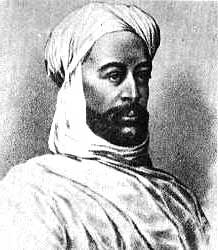Mahdi, al-
ca. 1840–1885
Sudanese religious leader
Al-Mahdi, the founder of an Islamic religious movement, seized control of SUDAN and established an empire that lasted for nearly 20 years. Born Muhammed Ahmad ibn Sayyid Abdullah, he began religious studies at an early age and joined a religious order in the capital city of KHARTOUM. He eventually left the order and moved with a number of disciples to an island in the NILE RIVER.
In 1881 he proclaimed that he was al-Mahdi, a religious leader who according to tradition would return to restore and purify Islam. He sent letters to religious leaders in Sudan, urging them to reject the Turkish-Egyptian political rulers who controlled the country. Two months later, against great odds, he and his followers managed to defeat an army sent by the Egyptian government. Over the next two years, three more government armies met the same fate, and many new supporters joined al-Mahdi's cause.

Assembling an army of some 100,000 men, al-Mahdi fought and defeated British troops led by General Charles GORDON and captured Khartoum in 1885. He then established his own capital across the Nile in Omdurman, where he set up an empire based on Islamic law and the teachings of the Muslim holy book, the Qur'an. But less than six months after his victory, he died suddenly, possibly of typhus. The Mahdiya, as his empire was known, controlled all of northern Sudan until 1898, when it was conquered by British troops. Al-Mahdi's successful revolt against foreign domination caused later Sudanese leaders to look up to him as the father of their country's independence. (See also Islam in Africa.)